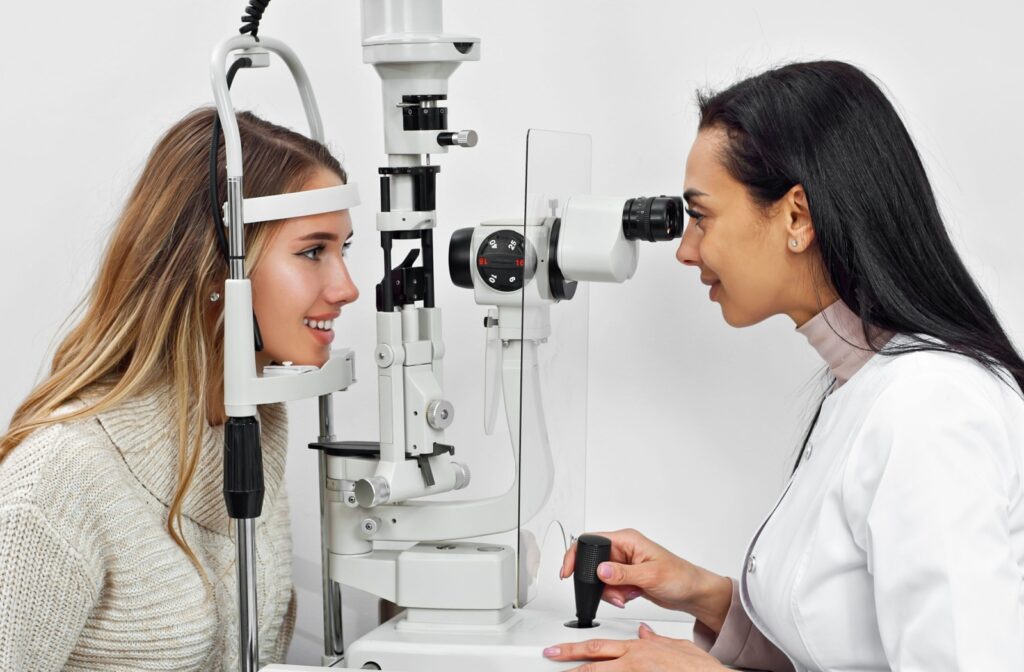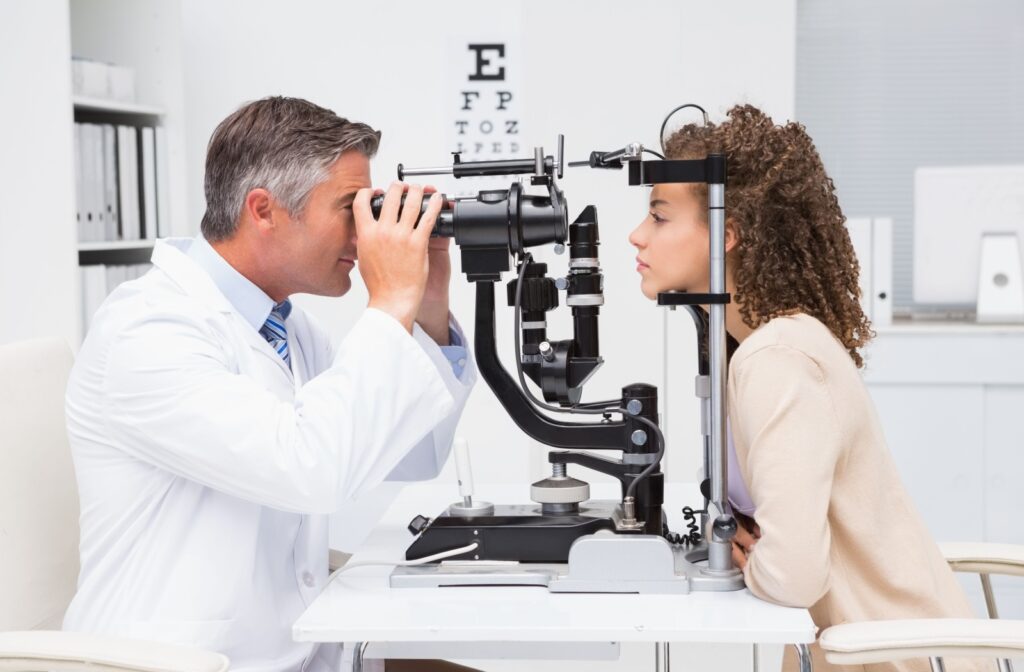Your eyes are incredible, and they can often be more complicated than you might think at first. During a regular comprehensive eye exam, your optometrist is going to look for a range of eye conditions and diseases. But what else can your optometrist diagnose?
In some situations, your optometrist may be able to recognize key signs of a brain tumor, like unusual swelling or pressure on the back of the eye. While this is a possibility, it isn’t a guarantee. If you have a family history of cancer, brain tumors, or any other brain-related condition, it’s essential to regularly get checked by an experienced healthcare professional.
The Importance of Regular Eye Exams
Over the years, your eyes undergo plenty of changes. But it isn’t just about vision and new prescriptions—a complete exam gives your eye care professional the chance to thoroughly examine your vision system to check up on your overall health. Think of it like a regular physical examination with your doctor.
During these exams, your optometrist will look for all kinds of potential problems. They’ll run through plenty of different tests that allow them to check things like:
- Your visual clarity
- The physical structures of the eye
- The status of your optic nerve
- How your eyes work together as a team
- The pressure inside your eyes
These comprehensive checks are crucial to your overall well-being. Eye conditions can develop slowly with subtle symptoms, and have critical effects on your quality of life. You should be visiting your optometrist at least once a year for a comprehensive eye exam, and more often if you have a previously-diagnosed condition.
This way, your doctor can look for signs of eye diseases and vision problems, but they’ll also be on the lookout for indicators of other health conditions. It’s amazing how much your eyes can reveal about what else is going on inside your body.
Can an Optometrist Catch Brain Tumors?
During a comprehensive eye exam, your optometrist will likely dilate your pupils. This allows more light to enter the eye and gives your eye doctor a way to check your optic nerve and retina.
This step is essential—and not just because of how it affects your vision. The optic nerve is the highway between your visual system and your brain. Sometimes, a brain tumor can cause changes in these structures that an eye doctor can catch, like swelling and discoloration.
Meanwhile, your optometrist can use various tests to determine whether your problems are being caused by a tumor or another brain-related issue. They can look for symptoms such as:
- Double vision
- Blurred or distorted vision
- Peripheral vision loss
If your optometrist suspects something serious, they’ll be able to refer you to a healthcare professional for further diagnosis and treatment.
However, it’s important to remember that while catching brain tumors is a possibility, it isn’t a guarantee. Your optometrist can look out for symptoms that you’re dealing with a tumor, but they can’t always diagnose this condition; tumors can be complicated, and they don’t always showcase eye-related signs. If you have a family history of brain tumors or cancer, you should regularly be screened by a healthcare professional.
What Conditions Can Be Detected During an Eye Exam?
While detecting a brain tumor is a possibility, it’s just one of many health conditions that an eye exam can potentially uncover. These exams can also catch the following conditions and more!
Refractive Errors
Your eye requires a specific shape to properly refract light, but that doesn’t mean they’re always perfectly round. When there’s a problem with the shape of your eye, light can’t properly refract. This is called a refractive error.
There are several types of refractive errors, with the common ones being:
- Myopia, or nearsightedness, where objects are blurrier the further they get from the eye
- Hyperopia, or farsightedness, where distant objects are clear but nearby objects are blurry
- Astigmatism, where the eye’s shape is more of an oval than a ball, resulting in distorted vision, where the cornea isn’t curved properly or universally
These conditions can be managed with glasses or contact lenses, and they’re easily detected during an eye exam.
Dry Eye
If your eyes aren’t producing enough tears or if the tears evaporate too quickly, you may have dry eye. This common condition can often cause:
- Burning, stinging sensations in the eyes
- Redness
- A feeling of grittiness or irritation
- Vision changes that come and go
This condition is also highly treatable through dry eye therapy.
Diabetes
Diabetes, a condition that affects how your body produces and uses insulin, causes long-term damage to blood vessels throughout your body. The eye is no exception; diabetes can damage the back of the eye in a condition called diabetic retinopathy.
If you have been diagnosed with diabetes, you should try and visit your optometrist at least once a year or more for diabetic eye exams. They’ll be able to examine the back of your eye to determine if your condition is damaging your eyes and vision.
Glaucoma
Glaucoma is a group of eye diseases that can permanently damage the optic nerve, often due to high pressure inside the eye. During an eye exam, your optometrist can measure the pressure inside your eye, allowing them to intervene sooner if needed to preserve your vision.
Cataracts
Cataracts develop when the natural lens of your eye begins to cloud. This is extremely common, and also highly treatable.
Your optometrist can check the clarity of your natural lens during an eye exam and diagnose any signs of cataracts early on. This way, they can monitor the progression and recommend treatment options when necessary.

Schedule Your Next Eye Exam
Regular eye exams aren’t just about vision. They’re about trusting an eye care professional to examine your eyes and diagnose any potential conditions before they become a problem. By working with a team like ours at Total Vision Campbell, you can be proactive about taking care of your eyes and vision.
So come visit our team! We’re here to check your eyes and look for symptoms of brain tumors, dry eye, and more. Book an appointment with us today, and let’s work together to preserve your vision. Your eyes will thank you!



